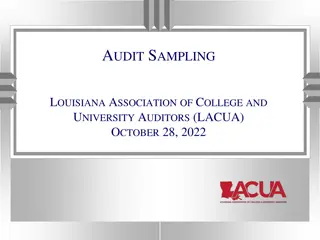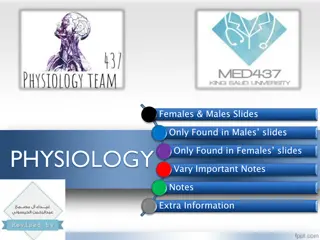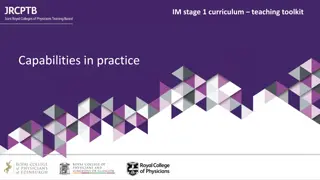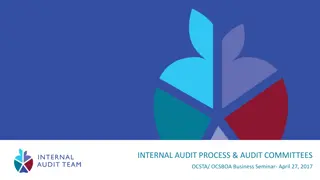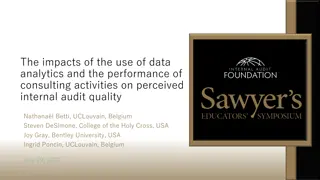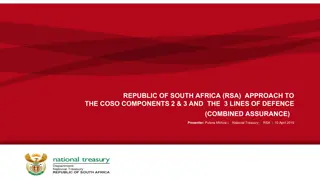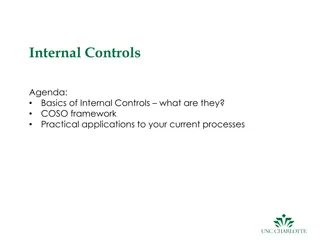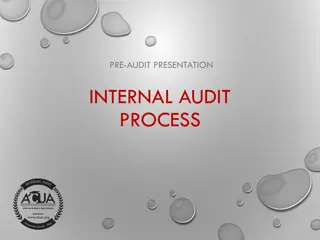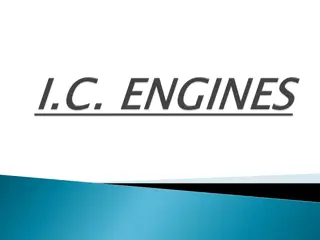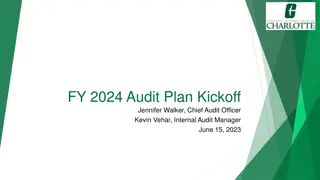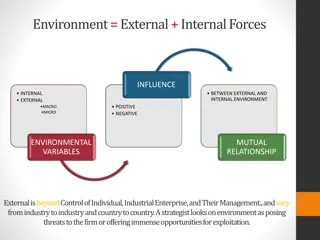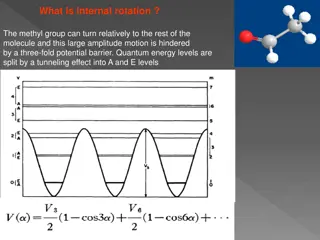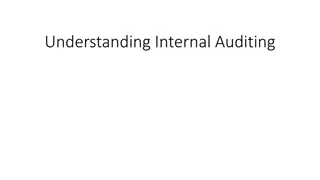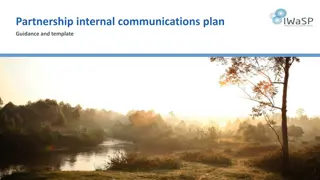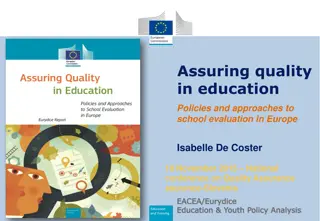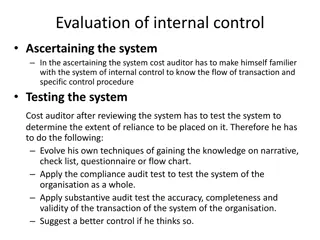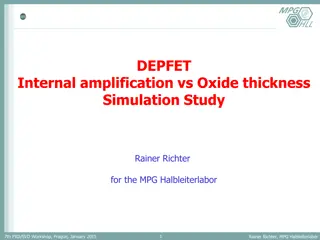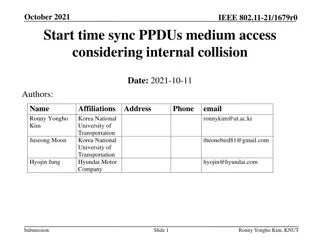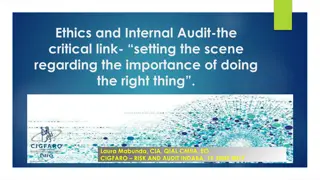Exploring Hybrid Auditing Methods in Corporate Governance
Project led by Gunilla Eklöv Alander delves into assessing security in corporate governance without an internal audit function. The study examines various professions contributing to digitalized internal control environments and analyzes the traditional division of responsibilities between internal
2 views • 8 slides
Actions Emanating from the Evaluation of the Governance Reform
The evaluation of the governance reform within the WMO aimed to assess its alignment with strategic objectives, effectiveness in responding to societal needs, coordination efficiency, decision-making process, agility, and more. Evaluation criteria included relevance, design validity, effectiveness,
1 views • 13 slides
Comprehensive School Quality Assurance and Evaluation Process
A detailed insight into the Quality Assurance Department's role in school evaluation and improvement processes, including Whole School Evaluation (WSE), Follow-through initiatives, Teaching and Learning assessments, Resumption and Examination Monitoring. The process involves both internal self-evalu
0 views • 20 slides
Methods of Training Evaluation: Overview and Importance
Training and development are fast-growing fields globally, including in India. Evaluation plays a crucial role in understanding the effectiveness and efficiency of training programs for human resource development. This presentation covers the concept of training, evaluation strategies, methods/model
0 views • 61 slides
Universal Evaluation Framework: Simplifying Evaluation Processes
This session introduces the Universal Evaluation Framework (UEF) developed for evaluating QAA Scotland Enhancement Themes. Participants learn key evaluation questions, evidence capture, and the Theory of Change to enhance evaluation confidence. The QAA Scotland Evaluation Odyssey details historical
2 views • 14 slides
Implementing Blind Evaluation Pilot in HORIZON EUROPE: Key Facts and Process
HORIZON EUROPE is conducting a pilot on Blind Evaluation in the 2023-2024 work program to address biases in the research and innovation evaluation process. The pilot aims to assess the feasibility of blind evaluations in ensuring fairness and mitigating potential biases towards well-known organizati
9 views • 9 slides
Audit Sampling Guidelines and Reference Materials for Internal Auditors
Review authoritative guidance for audit sampling and the potential for external auditor reliance on internal auditors. Understand and apply concepts related to audit sampling to project results with certainty. Available reference materials include AICPA Codification of Statements, AICPA Audit Guide,
6 views • 114 slides
Strengthening National Evaluation Capacity in the Era of Sustainable Development Goals
The presentation by Vijayalakshmi Vadivelu at the National Evaluation Capacities Conference 2017 in Istanbul focused on the importance of strengthening national evaluation capacity in alignment with the Sustainable Development Goals (SDGs). The content covers the holistic approach to national evalua
3 views • 18 slides
Exploring Developmental Evaluation for Better Decision-Making
Delve into the realm of developmental evaluation, focusing on its purpose, principles, and application in practice. Understand how developmental evaluation emphasizes real-time data collection for informed decision-making in complex systems. Learn about key principles such as developmental purpose,
0 views • 25 slides
Understanding Homeostasis: Maintaining Internal Balance in the Body
The concept of homeostasis is crucial for understanding how the body maintains a stable internal environment despite external fluctuations. This presentation covers the definitions of positive and negative feedback mechanisms, components of feedback loops, and the role of homeostatic mechanisms in p
0 views • 33 slides
Evaluation Practices in Macedonia: What Works, What Doesn't
The comparison between the effectiveness of evaluation practices and the presence of formal institutions in Macedonia raises questions about the impact of institutional design on outcomes. While some countries with robust evaluation institutions fall short in practice, others lacking such structures
1 views • 7 slides
Internal Medicine Stage 1 Curriculum Teaching Toolkit: Capabilities in Practice
Capabilities in Practice (CiPs) describe the professional tasks within the scope of internal medicine, utilizing expert assessors for assessment validity. There are 14 CiPs as learning outcomes for internal medicine Stage 1, with descriptors, performance levels, and evidence for entrustment decision
0 views • 11 slides
Internal Audit Process & Audit Committees Overview
Explore the functions and responsibilities of internal audit processes and audit committees in the context of school boards in Ontario. Covering topics such as governance, risk management, compliance, and internal controls, the content delves into the structure, mandate, and activities of internal a
2 views • 34 slides
Impact of Data Analytics and Consulting Activities on Internal Audit Quality
This research examines how the use of data analytics and consulting activities affect perceived internal audit quality. The study investigates the relationship between these factors and top management's perception of internal audit quality. Through online scenario-based experiments with middle and t
2 views • 11 slides
Enhancing Evaluation Capabilities in Mongolia for Agenda 2030
The Mongolian Evaluation Network in collaboration with UNDP is working to integrate the 2030 Agenda into national strategies and plans, establish institutional coordination mechanisms, align budgets, and enhance data monitoring systems. Key stakeholders including government agencies, NGOs, and inter
0 views • 9 slides
Understanding Demi-Regularity in Realist Evaluation
Realist Evaluation is a theory-driven approach focusing on understanding the context and mechanisms of action behind policies and interventions. This webinar explores the concept of demi-regularity in realist evaluation, its origins, and its application in analyzing complex evidence. Key aspects cov
1 views • 16 slides
Understanding Evaluation in Education
Evaluation in education is a comprehensive term that encompasses measurement, testing, and qualitative examination of student behavior. It involves both quantitative and qualitative descriptions, along with value judgments. Differentiating from mere measurement, evaluation provides a deeper analysis
0 views • 28 slides
Republic of South Africa (RSA): COSO Components 2 & 3 with 3 Lines of Defence Approach
The presentation delves into RSA's approach to the COSO components, focusing on Risk Assessment and Internal Controls. It discusses the legislative mandate, Treasury regulations, and the COSO Internal Control Integrated Framework. The Risk Assessment section covers levels, matrices, and key instrume
0 views • 13 slides
Understanding Internal Controls and the COSO Framework
Internal controls play a vital role in organizations, providing reasonable assurance on achieving objectives. The COSO framework outlines the five integrated components of internal control, emphasizing the importance of control environment, risk assessment, control activities, information, and monit
1 views • 18 slides
Sustainable Evaluation Systems Workshop Summary
Workshop on Sustainable Evaluation Systems by Stephen Porter at the NEC Conference focused on defining evaluation systems, addressing their failures, and emphasizing the importance of quality, use, and networks in achieving sustainability. Participants engaged in activities such as bingo card introd
0 views • 38 slides
Understanding Internal Audit and Controls Process
This content provides an overview of the pre-audit presentation, objectives of the presentation, the definition of internal audit, the role of internal audit in examining university departments, the university audit process, internal audit reporting lines, and insights on internal controls in an org
3 views • 30 slides
Strategic Management: Strategy Review and Evaluation
This chapter delves into the critical process of strategy review, evaluation, and control in strategic management. It covers the nature of strategy evaluation, effective evaluation systems, contingency planning, auditing, using computers for evaluation, and guidelines for effective strategic managem
1 views • 42 slides
Overview of Internal Combustion Engines and Their Components
Internal combustion engines are devices that convert fuel's chemical energy into thermal energy, which is then used to produce mechanical work. The engines can be classified into two types - External Combustion Engines and Internal Combustion Engines. Internal combustion engines include components l
2 views • 53 slides
Internal Audit Department Overview
The Internal Audit Department at the University of North Carolina Charlotte is led by Chief Audit Officer Jennifer Walker and Internal Audit Manager Kevin Vehar. The team provides risk-based assurance, advisory services, and investigations to enhance organizational value. Their mission is to offer o
1 views • 17 slides
Impact and Evaluation Toolkit for Churches and Christian Charities
This toolkit aims to equip churches and Christian charities engaged in small-scale social action projects to think about impact, measure impact, choose data tools, reflect on evaluation data, and use it effectively. It covers principles of evaluation, setting objectives, selecting indicators, storyt
0 views • 34 slides
Overview of Monitoring and Evaluation in the GEF
The Evaluation in the GEF and Training Module focuses on promoting accountability and learning within the Global Environment Facility (GEF) through monitoring and evaluation activities. The GEF Independent Evaluation Office plays a crucial role in assessing results, effectiveness, and performance of
0 views • 25 slides
Understanding the Impact of Internal Environment Components on Business Decisions
The internal environment of a business is influenced by factors like value systems, vision, management structure, internal power relationships, and human resources. These components have a direct impact on decision-making processes and organizational performance. By analyzing and understanding these
1 views • 32 slides
Insights into Internal Rotation in Molecules
Internal rotation in molecules, such as the methyl group in acetaldehyde and methyl acetate, involves large amplitude motions hindered by potential barriers. Quantum energy levels split due to tunneling effects, impacting rotational and torsional energy levels. Theoretical models like the Rho Axis M
0 views • 6 slides
Developing an Evaluation Work Plan for Effective Program Assessment
This presentation by Amy D. Andrade from San Jose State University focuses on developing an Evaluation Work Plan to identify responsibilities and timelines. It covers topics such as Evaluation Coaching Support, Webinar Outlines, Logic Model, Inputs-Outputs-Outcomes, Two Approaches to Evaluation, Pro
0 views • 29 slides
Evaluation Synthesis in Changing Contexts: Enhancing Knowledge for Development Effectiveness
Evaluation synthesis is crucial for promoting learning, reflection, and decision-making in development work. This process involves bringing together diverse knowledge sources to generate strategic insights and facilitate wider use of evaluation findings. The Independent Office of Evaluation of IFAD
0 views • 20 slides
Evaluation of FME Zero Emission Neighbourhoods in Smart Cities
The mid-term evaluation process of FME Zero Emission Neighbourhoods in Smart Cities involves self-evaluation, partner evaluation, and panel evaluation. The procedure includes scientific review, evaluation by scholars, and innovation assessment. Key documents like self-reports, progress reports, and
1 views • 20 slides
Overview of Regular Evaluation 2017 Findings in Estonia
In the Regular Evaluation 2017, efforts were made to maximize the benefits of evaluation outcomes for various stakeholders in Estonia such as the state, society, and institutions. The evaluation focused on a range of actions including preparing legislation, finding experts, creating self-report form
0 views • 6 slides
Understanding Internal Auditing: Role and Importance
Internal Audit Department exists to provide independent assurance, consulting services, and improve operations by evaluating risk management, internal controls, and governance processes. It reports to the campus president and the Director of System-wide Internal Audit at TBR while serving the colleg
0 views • 7 slides
Partnership Internal Communications Plan & Stakeholder Analysis
Developing an effective internal communications plan for a partnership involves drawing insights from stakeholder analysis, drafting, validating, and implementing the plan. Engaging with internal stakeholders, understanding their awareness, engagement levels, and expectations, and prioritizing commu
1 views • 6 slides
Comprehensive Guide to Training Evaluation Methods
This detailed guide covers the aim of evaluation, evaluation methods, techniques of evaluation, types of evaluation (formative, process, outcome, impact), and the significance of formative and process evaluation in assessing training effectiveness. Learn about the key principles and practices involv
0 views • 45 slides
Ensuring Quality in Education: School Evaluation in Europe
Explore the policies and approaches to school evaluation in Europe with a focus on external and internal evaluation methods, quality assurance approaches, and recommendations from the European Parliament and Council. Discover insights on the purpose and evolution of school evaluation, emphasizing th
0 views • 23 slides
Understanding Internal Control Evaluation Methods in Auditing
Auditors need to evaluate internal control systems by familiarizing themselves with the flow of transactions and control procedures. They must develop techniques like narratives, checklists, and questionnaires for testing, assess the impact of errors, report weaknesses, and determine reliance on the
0 views • 18 slides
DEPFET Internal Amplification vs. Oxide Thickness Simulation Study by Rainer Richter
The study explores the behavior of DEPFET internal amplification in comparison to oxide thickness through simulations conducted by Rainer Richter at the MPG Halbleiterlabor workshop. It delves into the differences in behavior between DEPFET and classical MOS transistors, shedding light on the reason
0 views • 11 slides
Understanding Start Time Sync Procedures in IEEE 802.11-21/1679r0
In the document authored by Ronny Yongho Kim et al., the focus is on start time sync PPDU medium access considering internal collision in IEEE 802.11-21/1679r0. It discusses the importance of defining a clear rule to resolve internal collision cases during medium access procedures. Specific attentio
0 views • 9 slides
Importance of Ethics in Internal Audit Practices
Ethics play a crucial role in internal audit, ensuring good governance, trust, and accountability. This article explores the definition of ethics, ethical culture, the IIAs Code of Ethics for Internal Auditors, and the significance of upholding ethical standards in conducting internal audit work.
0 views • 52 slides






